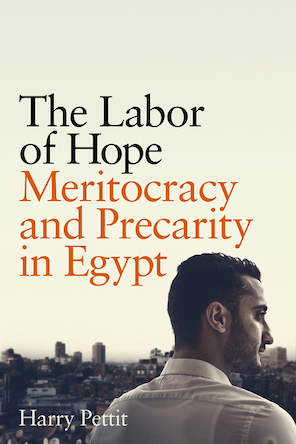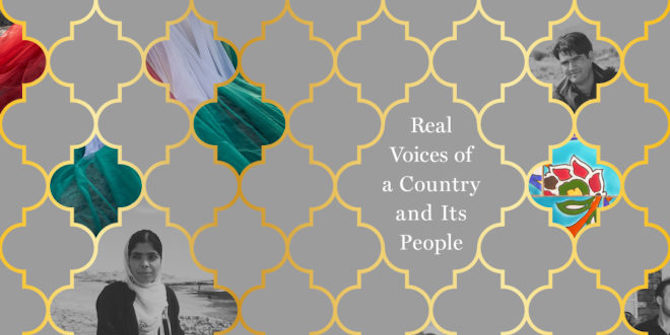by Andrew Delatolla
 In the article titled ‘Middle East Masculinity Studies’ published by the Journal of Middle East Women’s Studies (2011), Paul Amar engages in a critique of ongoing and hegemonic discourses on Middle Eastern masculinities. He also paves the way for future research in this field, highlighting the need to reengage in critical masculinity studies in the region. Amar takes note of the intersecting aspects that need to be considered, including the apparatus of state security, (neo)liberal economic transformations, class, social expectations, and processes of racialisation to which men are often subjected to by their governments and in the context of global politics. Picking up from Amar’s weighty call for engagement on these fronts, Harry Pettit’s book The Labour of Hope: Meritocracy and Precarity in Egypt carefully explores these themes by engaging with several middle-class male interlocutors in Cairo to undertake an ‘ethnography of hope’.
In the article titled ‘Middle East Masculinity Studies’ published by the Journal of Middle East Women’s Studies (2011), Paul Amar engages in a critique of ongoing and hegemonic discourses on Middle Eastern masculinities. He also paves the way for future research in this field, highlighting the need to reengage in critical masculinity studies in the region. Amar takes note of the intersecting aspects that need to be considered, including the apparatus of state security, (neo)liberal economic transformations, class, social expectations, and processes of racialisation to which men are often subjected to by their governments and in the context of global politics. Picking up from Amar’s weighty call for engagement on these fronts, Harry Pettit’s book The Labour of Hope: Meritocracy and Precarity in Egypt carefully explores these themes by engaging with several middle-class male interlocutors in Cairo to undertake an ‘ethnography of hope’.
In this well written book, Harry Pettit manages to capture the subtleties of post-2011 revolution Cairo and its social impact on men. While this study is concerned with the local dynamics of politics, economics, and social reproduction, Pettit manages to contextualise these developments within global economic flows and politics. As such, this is not only the story of Egyptian masculinities under the crushing weight of, on the one hand, neo-liberal reform and, on the other hand, social expectations, it is the story of continued exploitation and extraction of the Global South under the guise of development and progress.
Pettit details how educated young men in Egypt are sold a dream of middle-class development and progress. They are told that if they study and work hard, they can achieve economic security, travel the world, and lead a life of dignity under the auspices of a meritocratic free market. Like young people elsewhere who realise that the notion of a meritocratic free market based on labour engagement is an illusion, the Egyptian men that Pettit is engaged with do not present an exception. Rather, what makes the Egyptian context exceptional is the different social and political barriers that these men must navigate and overcome. This includes political repression by the Egyptian government, domestic economic inflation, and social pressures to replicate the middle-class lives of their parents. Although Pettit describes how these young men cope with the exigent pressures, including engaging in social activities and seeking romantic fulfilment, the coping mechanisms are evident of continued hope.
The hope for more and better is argued to be the mobilising factor behind the sincere engagement with a variety of education programmes, employment fairs, and promises for upwards mobility in roles at call centres or through emigration. Although Pettit describes his interlocutors as engrossed in these activities, they are also keenly aware of the difficulties in landing a position that would alleviate the economic and social pressures they face. In this engagement and awareness, the book clearly articulates the tensions that these young men face.
The book begins by laying out the foundations and framework for analysis. It is situated within a vast and complex scholarship on Egypt and further supported by scholarly critiques of global economic structures and capitalist development. Pettit notes, for example, that his ethnographic observations in Egypt illustrate that the young men he followed did not seek a postcapitalist vision of Egypt, ‘despite [experiencing] intense rupture’. Rather, they ‘continue to invest in the individualized hopes generated by a capitalist system’ (p. 12). To understand this dynamic, Pettit turns to feminist scholarship on emotions to ‘interrogate a politics and political economy of hope that may work in the service of labor markets’ (p.13). Notably, the perpetuation of service to labour markets remains constant, and to imagine otherwise is considered a failure among many of the interlocutors. Opening the question of why, given the disillusionment and the constant barriers, so many of these young men continue to have faith in the labour market.
The subsequent chapters of the book reveal how the barriers to upward mobility, such as lacking soft skills, educational certifications, and networking opportunities, also provide sustained hope for the young men trying to navigate the system. In the first chapter, Pettit outlines a variety of opportunities presented to young Egyptian men, all of which promise fulfilment. These opportunities, emergent from public, private, and development sectors offer training and developmental opportunities for young men seeking upward mobility. These programmes and training courses, while sold as an effective way to engage in the labour market, are sustained by a revolving door of young labourers willing to invest time and money in the promise of a future that may never materialise. The outcomes from such courses often provide limited access and reinforce in the students that they are the problem, not the system. Frequently focusing on ‘soft skills’, these programmes and training courses reinforce the capitalist politics of individualisation and reproduce class hierarchies.
Such class hierarchies are evident in the ‘new kind of factory’ of call centres, where young Egyptian men are described as frustrated, bored, and humiliated; unable to engage in upwards mobility due to lacking English skills and obtaining degrees from public universities. In chapter 2, Pettit describes the mechanisms developed by his interlocutors to cope with the pressure, feelings of failure, low pay, and deskilling. This includes reproducing middle-class masculinities outside of the economic sphere, creating detachment and distraction, and ultimately, as Pettit argues, requiring emotional labour.
The emotional labour required by these young Egyptian men, as described in chapter 2, is a product of hope. Discussed in chapter 3, such hope emerges from a variety of sources including self-help books, Hollywood films, religious texts, and recounting the stories of more successful friends. As Pettit argues in this chapter, the marketing of a particular version of success as attainable, meritocratic, and dependent on individual engagement facilitates the continued investment by these young men in low-paid and frustrating positions they find themselves in.
Social pressures do not only dictate the necessity of social mobility through economic gains, but, in the context of Egypt, success also includes the establishment of family life. As noted by Pettit in Chapter 4, the global transformations associated with modernity placed the nuclear family and marriage at the centre of society, making it an important aspect of individual and masculinised success. Following from this, Pettit, through his interlocutors, explores the labour of love and the role that economic precarity produces in hindering individual fulfilment. Many young men either receive help from their parents to create a home seen worthy for a marriage and family, or they postpone finding love and marriage to find economic success.
Even in positions where relative economic success is apparent, as is the case of young Egyptian men who emigrate to the Arab Gulf, Malaysia, and Europe, disappointment consistently looms overhead. In the final chapter, Pettit highlights the economic resources and labour that is poured into prospects of emigration. Straddling an illusion that emigration can provide answers and the reality of the difficulties that are produced in new and foreign environments, Pettit highlights the complications navigating visa and emigration applications and establishing new lives once emigrated. In doing so, Pettit underlines how Egypt is not an exception in a global capitalist system, but a casualty of ongoing injustice and the individual and social dilemmas that are created in the perpetuation of such a system.
Pettit’s book is well developed, allowing the Egyptian lives followed in the five empirical chapters to guide his thinking. Here, Egypt and the Egyptian people are not places or individuals to be studied, but act as a context to understand the world. This book, while dealing in earnest with Middle Eastern masculinities and neo-liberal economic realities in Egypt, is a study about global economic flows and politics and their impact on individuals.
[To read more on this and everything Middle East, the LSE Middle East Centre Library is now open for browsing and borrowing for LSE students and staff. For more information, please visit the MEC Library page.]






